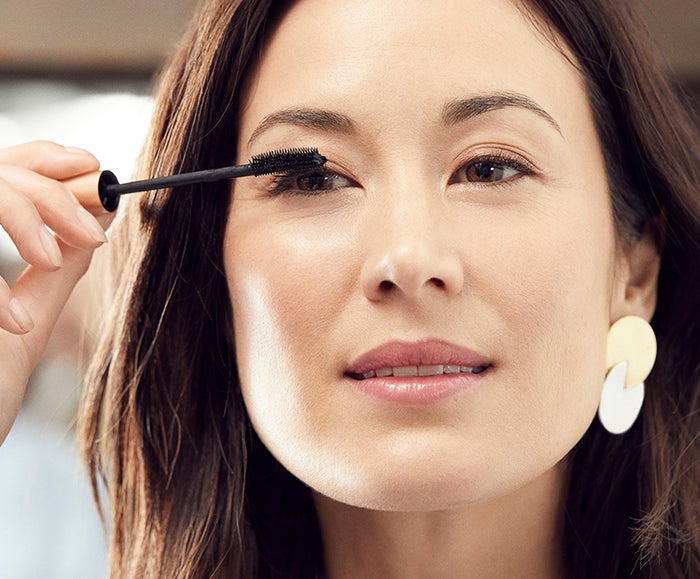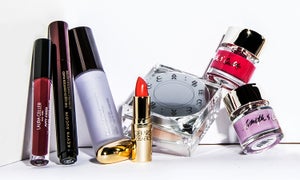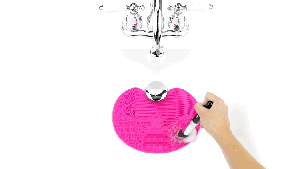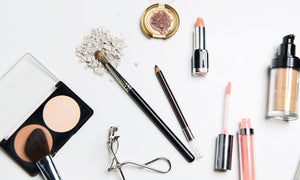

How do makeup products contribute to eye infection or allergies?
Raise your hand if you’re guilty of hanging onto your beloved mascara right until the very last drop? Especially when you heart a trusted product you’ve used for years, it’s normal to try and make it last. But the older a product gets, the more likely it is to cause issues, according to board-certified allergist, internist and chief medical officer at EHE, Dr. Tania Elliott. The deterioration, she shares, starts from the moment you open it. How come? She explains that each and every single time you dig into your liquid eyeliner, dabble with glitter shadow or whip out your eyebrow brush, you’re exposing yourself to bacteria that lurks in your home.
Apart from the dirt and dust your eye makeup might come in contact with, Dr. Elliott says that certain products pose more danger than others. This is especially true if they’re ripe with countless ingredients. “Fragrance, nickel and makeup preservatives are the most likely culprits,” she shares. One way to test a questionable product before applying it over your lid or lash is to dab it behind your ear for a few days and watch how your skin reacts. Dr. Elliott says this might save a ton of headache in the future.
What are some symptoms?
Doctor Adam J. Scheiner M.D. explains that eye infections can take form in two ways: bacterial or viral. If you’ve somehow scooped up a form of bacteria, he says your eye could turn red and you could experience more discharge than normal. You might also have a bit of eye swelling, and you could be somewhat contagious.
With a viral infection, you’ll still experience a red tint to your eyeball, but your eyes will be more watery than mucus-like. “You might also have swelling in the cheeks area near the ear. These usually follow an upper respiratory infection. These can be very contagious and spread from individuals to other individuals,” he explains. “This is the typical contagious ‘pink eye.’” How would you contract this? He explains that some viral particles can stay on inanimate objects for weeks where it can be picked up by a new person and cause a new infection.What should you do if you suspect an infection?
Repeat after us: if you suspect an infection—stop using your eye makeup immediately.Then, it’s important to clean your eye area thoroughly to avoid further spreading of the rash or irritation. For a few days---as long as you’re not in pain---Dr. Elliott suggests using rewetting drops to wash out allergen and/or infection from your eyes. If the problem continues to persist, ophthalmologist Dr. Rayna Habash urges sufferers to seek the help of a medical professional or specialist ASAP. “There are so many things that can cause the same symptoms of an eye infection or allergy so it is important to have a professional determine what the cause is, such as when a patient has seasonal allergies versus an allergy to a makeup product,” she adds.
How to keep your eyes safe
Much like the way you take vitamins to prevent yourself from getting the flu, there are steps to set you up for success with your eye makeup products. You probably already exercise a few of these best practices, but just in case you need a refresher, take it from the pros:1. Follow expiration dates.
If your mascara says it’s only good for three months, listen to it. Same goes for your other eye makeup. Even if you have enough left for another few weeks or so, Dr. Elliott says you will face a higher risk of infection the longer you hold onto your products past their use. Here's a quick guide on how to know if your beauty product has gone bad.2. Never share makeup.
You and your gaggle of friends are getting ready for an evening out to celebrate a birthday, sipping wine and mixing all of your products together. It’s a normal way for many women to spend time together, but Dr. Scheiner warns against sharing products. If you absolutely can’t not help a sister out, he suggests purchasing fresh, one-use applicators that will decrease your exposure to bacteria and infection.3. Clean your face before application.
When you wake up in the morning, do you always wash your face? Dr. Scheiner says this small added step will keep eye infection at bay. “Before applying makeup, clean eyelids and face. Always apply makeup outside the lash line and away from the eye. This helps keep oil glands of the upper or lower eyelid from getting blocked,” he explains.4. Remove your eye makeup thoroughly before bedtime.
We know, we know: you’ve had a long day. You’re exhausted and the last action item on your to-do list is washing your face. You are tempted to skip it, but try not to, according to Dr. Schiener. “Brush a clean cotton swab along the base of eyelashes to remove all makeup remnants to be safe. When using eye makeup remover, avoid getting it in your eyes and rinse your eyelids afterwards,” he says.5. Pay attention to ingredients and reactions.
While this is less preventing and more prescriptive, ophthalmologist Jean Keamy, MD explains that being sensitive to your reactions will help prevent an intense infection. “The only way to prevent an allergy is to avoid ingredients that have caused allergic reactions in the past,” she shares. Take note, especially when you’re trying a new brand.
6. Stop touching your eyes.
Consider everything you’ve already touched today: your keyboard, your steering wheel, a number of door handles, food—and counting. So when you start to rub your eyes, you’re pushing more of your makeup---along with bacteria---into your eyes. Dr. Keamy says to try not to touch your eye area during the day, unless you wash your hands first.7. Be delicate with eye makeup application.
Even if you’re going for a heavy, smoky look, Dr. Habash says to tread lightly and smartly. “Be delicate when applying makeup around the eyes. Both the eyes and the skin around them are very sensitive,” she explains.

Lindsay Tigar is a travel and lifestyle journalist who contributes to a myriad of publications—from Travel + Leisure and Vogue to Glamour and countless others. She's a digital nomad who works from every corner of the globe, scoping out the best coffee, collecting artisan crafts and testing every beauty product she can find. You can find a collection of her work at LindsayTigar.com.







